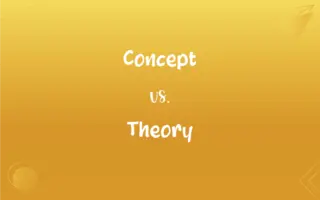Discrete vs. Discreet: What's the Difference?
Edited by Aimie Carlson || By Harlon Moss || Updated on October 25, 2023
"Discrete" means separate or distinct, while "discreet" implies being careful or unobtrusive. Both have different meanings and uses.

Key Differences
"Discrete" is an adjective that primarily refers to something that is distinct or separate from others. In mathematics and science, the term is used to describe distinct units or data points that are not continuous. On the other hand, "discreet" pertains to showing prudence or being careful in one's actions, especially in order to keep something confidential or to avoid causing offense.
When we say that data points are "discrete", we mean they are separate and non-continuous, as opposed to data that flows in a continuous stream. For "discreet", it might refer to a person who is good at keeping secrets, or actions done in a way that avoids drawing unnecessary attention. It's all about subtlety and tact.
The distinction between "discrete" and "discreet" is crucial in their usage. While they sound similar, their meanings don't overlap. If you're talking about separate entities or distinct items, "discrete" is the appropriate choice. For situations where caution, diplomacy, or subtlety is highlighted, "discreet" is the go-to word.
Even in professional contexts, these terms hold their distinct meanings. For instance, in electronics, "discrete components" refer to individual electronic components, whereas a "discreet conversation" in a business context would imply a private or confidential discussion.
Comparison Chart
Word Type
Adjective
Adjective
ADVERTISEMENT
Syllables
2 (Dis-crete)
2 (Dis-creet)
Part of Speech
Adjective
Adjective
Typical Use
Describing separate or distinct items
Describing careful or unobtrusive actions
Use in Sentence
"The list has discrete categories."
"He made a discreet exit from the party."
Discrete and Discreet Definitions
Discrete
Individually separate and distinct.
There were three discrete sections in the report.
ADVERTISEMENT
Discreet
Careful and prudent in one's speech or actions.
She was discreet in her inquiries about the job.
Discrete
Non-continuous in nature or value.
Discrete data points were plotted on the graph.
Discreet
Having or showing discernment or good judgment.
A discreet pause in the conversation allowed him to reflect.
Discrete
Detached from others.
The islands are discrete entities spread across the ocean.
Discreet
Intentionally unobtrusive.
He wore a discreet tie to the formal event.
Discrete
Distinct and unconnected.
There are discrete problems in this system that need attention.
Discreet
Modest and understated in design or appearance.
She chose a discreet shade of nail polish.
Discrete
Separate and distinct.
The project was divided into discrete phases.
Discreet
Cautious in order to avoid causing offense.
Be discreet with your comments in this sensitive situation.
Discrete
Constituting a separate thing
Computers treat time as a series of discrete moments rather than a continuous flow.
Discreet
Possessed of, exercising, or showing prudence and self-restraint in speech and behavior; circumspect
The teacher was discreet in discussing the student's behavior. We followed him but kept a discreet distance.
FAQs
Can "discrete" refer to individual items in a set?
Yes, items that are separate from one another are "discrete."
Can "discreet" describe someone's personality?
Yes, someone who is cautious or subtle can be described as "discreet."
What does "discrete" mean?
"Discrete" means separate or distinct.
Is "discrete data" the same as "discreet data"?
No, "discrete data" refers to distinct data points, whereas "discreet data" is not a standard term.
Can levels or stages be "discrete"?
Yes, if they're distinct and separate, they're "discrete."
Does "discreet" always imply secrecy?
Not always; it can also imply tactfulness or subtlety without secrecy.
Can "discreet" refer to design?
Yes, a design that's subtle or understated can be called "discreet."
Can objects be "discrete"?
Yes, objects that are distinct and separate are "discrete."
Can a sound be "discreet"?
Yes, a sound that's soft or subtle can be described as "discreet."
How is "discreet" different from "discrete"?
"Discreet" implies being careful or unobtrusive, while "discrete" means separate.
What's the opposite of "discreet"?
"Indiscreet" or "overt" can be opposites, depending on context.
Is "discreet" only used in positive contexts?
Mostly, but it depends on context. It generally implies tact or subtlety.
How do I remember the difference between "discrete" and "discreet"?
Remember "discrete" has two separate "e"s, and "discreet" implies subtlety.
Is being "discreet" always a good thing?
Generally, it's seen as positive, but being overly discreet might imply avoidance in some contexts.
Can "discrete" describe emotions?
If they're distinct or separate, emotions can be described as "discrete."
Are "discrete" and "discreet" homophones?
They sound similar but have different meanings and spellings.
Is "discrete mathematics" about being tactful?
No, it deals with distinct mathematical structures.
Can a gesture be "discreet"?
Yes, a subtle or unobtrusive gesture can be "discreet."
Does "discrete" have a noun form?
No, it's primarily used as an adjective.
Can "discrete" refer to time periods?
Yes, if they're distinct periods, like "discrete moments in history."
About Author
Written by
Harlon MossHarlon is a seasoned quality moderator and accomplished content writer for Difference Wiki. An alumnus of the prestigious University of California, he earned his degree in Computer Science. Leveraging his academic background, Harlon brings a meticulous and informed perspective to his work, ensuring content accuracy and excellence.
Edited by
Aimie CarlsonAimie Carlson, holding a master's degree in English literature, is a fervent English language enthusiast. She lends her writing talents to Difference Wiki, a prominent website that specializes in comparisons, offering readers insightful analyses that both captivate and inform.






































































